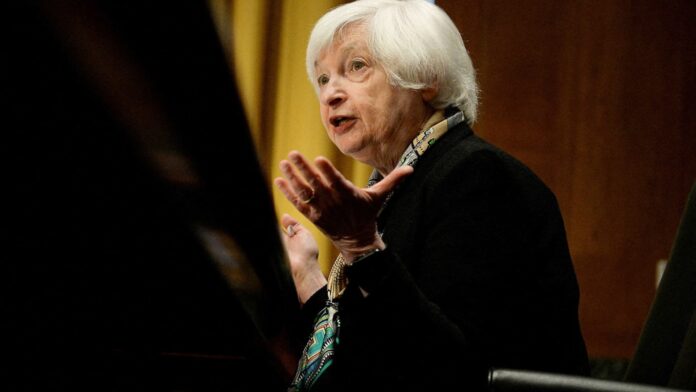U.S. Treasury Secretary Janet Yellen testifies before a Senate Finance Committee hearing on Capitol Hill in Washington, March 16, 2023.
Mary F. Calvert | Reuters
WASHINGTON — Treasury Secretary Janet Yellen said Thursday that the federal emergency actions to back up Silicon Valley Bank and Signature Bank customers could be deployed again in the future if necessary.
“We have used important tools to act quickly to prevent contagion. And they are tools we could use again,” Yellen said in written testimony before a House Appropriations subcommittee.
“The strong actions we have taken ensure that Americans’ deposits are safe. Certainly, we would be prepared to take additional actions if warranted,” she added.
Yellen’s testimony came amid growing market concerns over small and mid-sized regional banks that have experienced a rush of withdrawals in the wake of the SVB collapse, and specifically whether the federal government is prepared to backstop these banks in the event of a run.
In Washington, Yellen has drawn criticism from lawmakers who argue that the decision to insure deposits at SVB and Signature amounted to a reward for big banks that took excessive risks.
Meanwhile, lawmakers say, smaller institutions are being forced to confront a spike in deposit outflows — triggered by public fears about the big banks — without any special help.
Regional bank stocks fell Wednesday in part because of comments Yellen made at a Senate hearing that afternoon, in which she said Treasury was not considering any plans to insure all U.S. bank deposits without congressional approval.
Thursday’s remarks appeared to shift somewhat, leaving open the prospect that Treasury could still take future emergency actions in order to prevent broader contagion and preserve large-scale financial stability.
Last week, Yellen said uninsured deposits would only be covered in the event that a “failure to protect uninsured depositors would create systemic risk and significant economic and financial consequences.”
Outside of its emergency systemic risk exception, the executive branch has little control over U.S. bank deposit insurance, because the limit is set by Congress.
The current FDIC insurance limit of $250,000 was set in 2010 as part of the Dodd-Frank financial reforms. Congress can also temporarily suspend the limit, like it did in 2020 as part of the government’s response to Covid-19.
But so far, only a handful of Democrats have openly suggested Congress consider raising the limit across all deposits in the wake of the SVB collapse. Meanwhile, an influential bloc of House Republicans has already come out against any hike. This makes it difficult to envision how a bill to raise the limit would pass the GOP-controlled House.


